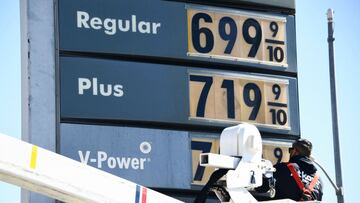What state has the highest gas prices? Where are gas prices the lowest?
Record prices are being paid by consumers at the pump. Increases are expected in the coming days and weeks. Which states are seeing the highest price tag?


The pandemic placed immense stress global supply chains that are extreamly susceptible to bottlenecks and other supply and demand shocks.
One of the goods that ensures the free movement of goods through supply chains is of course, oil. However, with global politics beginning to impact global supply and cost, prices are hitting an all time high in the US.
The Bureau of Labor Statistics reported that the Consumer Price Index for gasoline ballooned 6.6 percent in February. This is after a slight decrease of -0.8 percent was tracked in January. For a short time it seemed that the country may finally begin to see prices even out across the economy, but Russia's invasion of Ukraine sent markets spinning and energy prices trending upward, once again.
Which states have seen the highest percent increase in gas price?
| Ranking | State | Percent Increase |
| 1 | Alabama | 37.39% |
| 2 | Georgia | 37.34% |
| 3 | Virginia | 37.31% |
| 4 | Tennessee | 36.15% |
| 5 | Louisiana | 36.04% |
| 6 | Texas | 35.95% |
| 7 | Mississippi | 35.43% |
| 8 | Indiana | 35.18% |
| 9 | Kentucky | 35.14% |
| 10 | North Carolina | 35.04% |
| State | Percent Decrease | |
| 41 | California | 24.60% |
| 42 | Wyoming | 24.54% |
| 43 | Montana | 23.93% |
| 44 | North Dakota | 23.81% |
| 45 | Oregon | 23.75% |
| 46 | Washington | 23.21% |
| 47 | Iowa | 22.81% |
| 48 | South Dakota | 21.25% |
| 49 | Nebraska | 20.38% |
| 50 | Hawaii | 12.81% |
Which states have seen largest increases in price?
Since March 2021, AAA has reported that gas prices have increased more than fifty-one percent and just in the last month consumers are on average paying 15.25 percent more for regular unleaded gasoline. In dollar amounts this means that customers are paying around $1.56 more than they were last year and a staggering $0.79 since last week.
As a percent Alabama, Georgia, and Virginia have all seen an increase of thirty-seven percent in the last week. Hawaii is the only state that has seen seen a percent increase under twenty. In nominal terms Californians are paying the most over the last week with an average of a $1.02 being added to their gas receipts.
What is being down to lower the price of gas?
Earlier this week President Biden announced that the United States would place a ban on the import of Russian oil, gas, and other energy resources, placing greater economic pressure on the Kremlin.
"Today I’m announcing the United States is targeting the main artery of Russia’s economy. We’re banning all imports of Russian oil and gas and energy. That means Russian oil will no longer be acceptable at U.S. ports, and the American people will deal another powerful blow to Putin’s war machine," said President Biden when making the announcement.
The President described the bipartisan support of the measure, while also outlining the actions that would be taken in an attempt to reduce a run on gas or a surge in price at the pump. Biden also announced that together with partners more than sixty million barrels of oil will be released from "joint oil reserves," half of which will come from the US.
There was also clear message to companies operating in the US that purchase Russian energy resources: "it’s no time for profiteering or price gouging." However, since the announcement, very little change in the market has been seen. American oil field service company, Halliburton, has seen an eleven percent in crease in the value of their stock in the last month. This comes after Ukrainian officials called on the company to cease its operations in Russia to cut off a major revenue stream to Putin. So far those calls have gone unanswered, according to Bloomberg.
What else could be done?
There are various options on the table that could help to bring down the price of gas for consumers.
Michigan's House of Representatives voted to repeal the state's gas tax this week and the state Senate is expected to vote on the bill next week. Michigan's governor, Gretchen Whitmer, has rejected the bill, but endorsed a proposal, in coordination with other governors, calling on the US Congress to repeal the federal gas tax through the end of the year. This sort of maneuver would protect state revenue streams which the governor believes are critical to making good on her campaign promise of 'fixing the damn roads!'
Other states are considering similar proposals, but none have been passed into law.
In Georgia, Gov. Brian Kemp has said that he is working with the state's legislator to “to provide relief to hardworking Georgians - both in the form of a tax refund and lower gas taxes.” The current state gas tax in Georgia stands at around $0.18.
Georgia should halt gas tax amid rising prices at the pump, Gov. Brian Kemp says. https://t.co/jd448Xukvz pic.twitter.com/1FVCxslGQA
— AL.com (@aldotcom) March 9, 2022
Additionally, the White House is looking to negotiate with members of the Organization for Oil Exporting Countries (OPEC) to see if they would increase their supply to global markets to help bring down prices.
Related stories
These talks have yet to get off the ground as the White House is having a difficult time getting leaders on the phone. Saudi Arabia's Crown Prince Mohammed bin Salman has distanced himself from Washington after President Biden accused him of the ordering the murder of Washington Post journalist Jamal Khashoggi in 2018.
From @SPGCI: OPEC and its allies posted their highest monthly crude oil output increase in February since July 2021, but the 19 members with quotas still fell 764,000 b/d short of their collective targets: https://t.co/SW1sqZJMDU pic.twitter.com/Q8j19feGku
— S&P Global (@SPGlobal) March 10, 2022
OPEC will increase production slightly in April, but not at the levels needed to counter the drop off the US will see after the implementation on the Russian ban.

